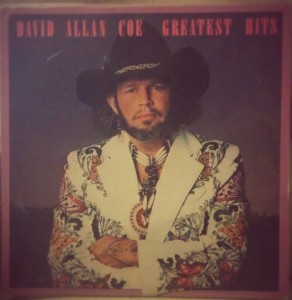I am not a perfectionist in the the traditional sense, I don’t read these blog posts over and over again to correct grammar or even make sure I have removed all the redundancies, for example, read the opening line. That, however, does not mean I am not finicky, in fact it may just be a different kind of perfectionism. What I mean Is, I work very hard to make sure that my message is clear (even when the messages is “Meh!”).
My process is a little strange, sometimes these things write themselves and sometimes they are a wrestling match but, I have never been more blocked on a post than when I sat down to write about David Allen Coe. My first version of this post read like an apology for appreciating his music. And if you know anything about his personal life or his beyond questionable taste you might understand my reticence. The problem with my first few drafts of this post was that I was trying to whitewash Coe, however, that brings problems. First, it’s just not honest, second, it is ridiculous to believe in the possibility, David Allen Coe lives down a dark rabbit hole, light may not actually reach that far. Of course, were he to read that I suspect he would laugh call me something inappropriate then tell me through which orifice I can shove his record (after pointing out I must have forgotten he’d been to prison).
But the fact is, his music is too important to overlook, especially for someone like me who purports to like “all kinds” of music. I would even be willing to say that we need musicians like David Allen Coe, because I may have to admit that I don’t care for his personality, he keeps me (and Nashville) honest. There may be no other country artist that understands exile more than David Allen Coe, in fact, he often sings about it. I can’t listen to songs like, You Never Called Me By My Name, or Longhaired Redneck without hearing about a good ‘ol boy system within the good ‘ol boy system.
In You Never Called Me, Coe points out that he fits in a lot better when people think he is Merle Haggard or Waylon Jennings. In Longhaird Redneck He is very clear that DJ’s don’t’ go to his shows, and they seldom like to play his music, though he doesn’t really care, and wouldn’t want it any other way. Coe was never afraid to call out the establishment in Country Music, and his fans loved him for it.
On a side note, he may be the progenitor of the oldest country music joke in the world (What do you get when you play a country song backward?) in You Never Called me, he points out that the best country music songs have to mention Momma, trains, trucks, prison, and being drunk. In fact the song is so catchy I am no longer surprised to hear my 13 year old daughter sing, “I was drunk, the day my momma got out of prison.” The song uses thick sarcasm questioning the repetitive nature of country themes. It me of an Entertainment Weekly article that came out a few years ago pointing out that all the top charted country songs of 2013 utilized the same themes over and over again: trucks, Dirt Roads, begging girls to get into trucks, tight blue jeans, river banks, the sunset, and the good stuff. I can’t imagine Coe would have cared much for bro country.
I could give you a lot of examples but the big question is, would I recommend you listen to David Allen Coe? Yes! Do I recommend you like him? Meh! One of the important things I take from Coe after a few songs is that country is not immune to this classic music establishment that like all other establishments, frames one specific narrative, a shiny one (even if it’s depressing). Even among what is known as Outlaw Country Music David Allen Coe often finds few friends, and even fewer supporters. I would be oversimplifying to say that that we should take the message, “Be yourself,” from Coe because he is generally just being stubborn, but there is something deep happening in his music we need to hear. I wish I could tell you what it was, it would make this post much easier to write.
In the future you will hear about Willie and Waylon but I felt like I had to start with Coe, for some reason it just felt more honest. Believe me, I wanted to start with Merle Haggard, Merle would have been easy to write about. But, why is it more honest to start here? Some people call it piss and vinegar and some say it’s just being stubborn, but I think that anyone who isn’t afraid to call out their establishment even when it can hurt their career is worth a listen. It is something we have to hear, so that when we need to call them out we can stifle our fear.
Because at the end of the day, standing up reminds us what it’s like to be left standing in the rain.


